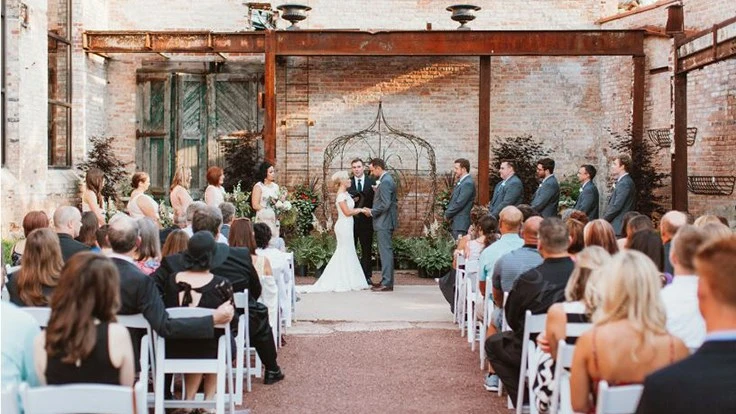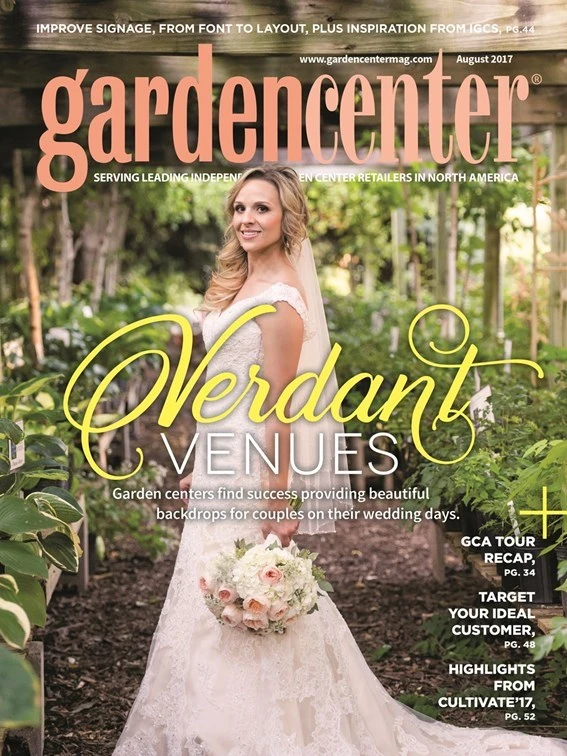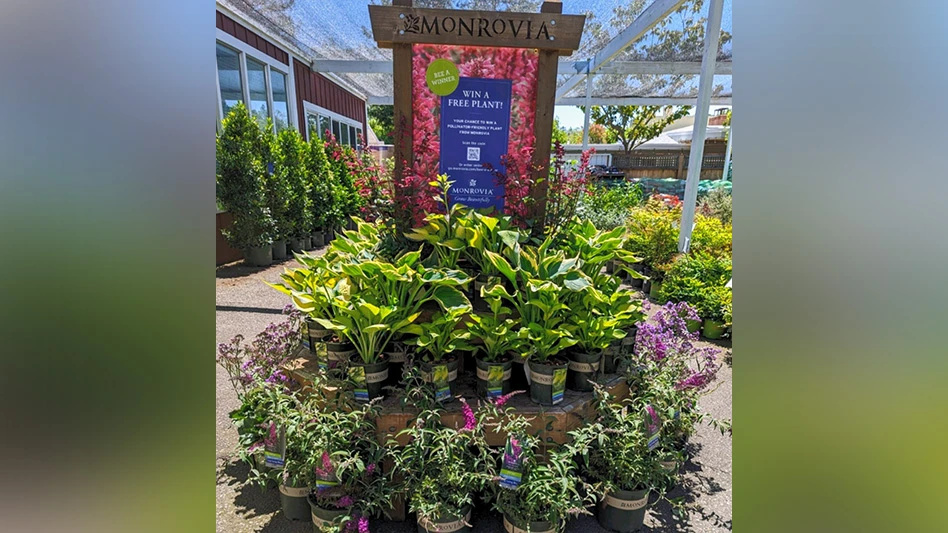

Weddings come with many traditions: first dances, exchanges of vows and rings, white dresses and towering cakes. But increasingly, couples are choosing to put a new spin on their nuptials. Many still get married at the usual venues, like religious centers and ballrooms. However, many brides and grooms are opting to go in different directions for their ceremony and reception location by using places that are sacred to them. Whereas once people followed the customs of their families, offering a one-of-a-kind experience for guests is a goal of many weddings today.
That means business opportunities for garden centers, who are already commanding thousands of dollars in a day to rent out their facilities.
Hosting these big events offers other unexpected benefits beyond profits, according to the garden center owners and wedding coordinators interviewed for this article.
The average age that people get married is increasing. According to statistics from the Pew Research Center, it is 29 for men and 27 for women in the U.S. That is the generation that garden centers are trying to get into their stores. Tim Travis, president of Goldner Walsh Garden & Home, which has hosted weddings extensively since the recession, may have put it best: “Any time you have any event, you’re dealing with 50 to 200 people coming to your store, and 50 to 75 percent of them have never been there. Every regional business would love to have that many new customers come every week, particularly when they are paying me to come.”
Wedding planning isn’t for the faint of heart, however, so this month, we dig into the details of hosting these events, and share experiences from three independent garden centers that execute the big day. They offer their planning advice and lessons learned, so that garden centers interested in venturing into this completely different segment of business are prepared.
All have seen an increase in interest and profits since they started hosting ceremonies and receptions, and wedding trends seem to align with the kind of places IGCs inherently are.
For example, according to an article on 2017 wedding trends by The Knot, “Expect to see pops of bold shades and bright color pairings. Pantone named Greenery the Color of the Year — it’s vibrant and earthy, making it perfect for all seasons.
“This fresh hue is symbolic of ‘the reconnection we seek with nature, one another and a larger purpose,’ says Leatrice Eiseman, executive director of the Pantone Color Institute. We expect to see this shade of green in everything from floral arrangements to colored linens.” And in venues, perhaps?
People want natural light, a rustic feel and verdant spaces. These popular options don’t seem to be fading, meaning weddings and garden centers could quite possibly be the perfect match.
Why they decided to enter the wedding business
Blumen Gardens: Joel Barczak, who owns Blumen Gardens with his wife, Joan, says the garden center’s first event wasn’t exactly planned. There was an outdoor fundraiser that was supposed to be downtown to raise money for the Red Cross’ effort to support victims of Hurricane Katrina. The event planners were worried about the weather, however, so they asked Barczak if they could use one of the spaces he had available in the historic factory he restored for his business that also houses other shops. The event was a huge success, they raised $35,000, and Barczak started getting requests for other events, including birthday parties and eventually weddings.
Buchwalter Greenhouse: Buchwalter started trying to promote weddings in 2014 as a way to diversify business and add another profit center during the off-season, says Tiffany (Buchwalter) Sustar, wedding coordinator and general manager. Once Sustar’s sister Bethany Ream decided to get married there, weddings took off.
Goldner Walsh Garden & Home: Tim Travis, president of Goldner Walsh Garden & Home, hosted the first wedding ceremony at his garden center back in 2002 for his friend, who wanted to get married Easter weekend but couldn’t find a church. Then, after the economy crashed in 2008, Travis decided to stop growing plants and use his production greenhouses as event space, and reinvented other aspects of his business.
BLUMEN GARDENS | PHOTOS BY MINDY LEIGH PHOTOGRAPHY
Space options
Blumen: Ceremonies take place outdoors in The Courtyard, a beautifully landscaped space that has brick walls and industrial beams juxtaposed with flowers, trees and shrubs. The reception takes place indoors in The Garden Room, housed in a factory that dates back to 1869 and features a wood ceiling, open beams, exposed brick and other rustic features. Cocktail hour takes place right in the garden center, which can include passed apps and is decorated with uplighting, high-top tables and string lights and also includes a pond. There is air conditioning, heat and indoor plumbing in The Garden Room, which can seat up to 220. There isn’t a designated space for the bridal room, but the bathroom has a full-length mirror and countertop.
Buchwalter: Wedding ceremony and receptions are held right in the retail greenhouse, which can seat up to 250. “The greenhouse is just heated, there’s no cooling. We let our couples know that it’s going to be like having an outdoor wedding but you have the protection of being inside, and there are fans all around,” Sustar says. “When they book a wedding with us, we include use of our facilities, and we have a bridal room that the bride can get ready in or just keep all of her things there and have a place to freshen up other than the bathroom.” The retail space is transformed, and the garden center stages with space with potted plants, hanging baskets and a fountain.
Goldner Walsh: The store is on 12 acres, and weddings are hosted in two greenhouses previously used for production and in a landscaped area for events. But when a couple rents the space for events, they have the entire nursery available to them, Travis says. Travis ceased growing operations after the economy crashed and transformed the greenhouses into The Cedar House, a smaller greenhouse for more intimate weddings, and The Celebration House, a 3,200-square-foot space that can host 180 seated guests. The spaces do not have heating or cooling, but there are indoor bathrooms.
When wedding spaces are available
Blumen: Year-round, all weddings start at 6 p.m. after regular garden center hours
Buchwalter: July through January only; events can start any time after 3 p.m. Buchwalter is changing its mid-summer hours soon from 8 a.m. to 5 p.m. Saturday to 3 p.m. to accommodate weddings. “It’s so hot [in the summer] that there’s not many people who come in after the afternoon rush,” Sustar says. “I know we could be doing weddings in spring, but they don’t compete with the sales that we do.”
Goldner Walsh: May through mid-November, most start after 6:30 p.m.
What they provide other than space rental
All provide tables and chairs; none provide catering/food, alcohol or linens.
Blumen: “We have two event attendants at each party, so they are working the perimeter, checking the bathroom, cleaning up spills,” Barczak says. “We’re on-site and very involved. We do the decorating. We don’t let people go on the ladder. There’s a certain amount we charge per hour to cover our costs. We don’t want to greatly profit, but we don’t want people to hurt themselves.”
Buchwalter: “We offer general housekeeping services and clean up, take care of trash removal and recycling, check on bathrooms to make sure they are clean, stage the greenhouse with different types of foliage plants and fountains,” Sustar says. “When they walk in, they can set up what they want, but it’s ready to use when they walk in.” Sustar is usually the staff member on site for the weddings.
Goldner Walsh: Dishes, glassware and silverware are available for rent, and the rest, other than tables and chairs, is DIY.
Managing catering/alcohol
None of the garden centers interviewed provide food or alcohol, but also do not require that guests use specific vendors, a benefit that helps them stay competitive with other venues in the area.
Approximate number of weddings hosted each year
Blumen: Average of more than 30 a year. Saturdays in peak months are booked for 2018, so Blumen is only scheduling Fridays and Sundays, unless the couple wants January, February or March.
“Our peak is May-October, and September has become the new June for us. Our September will book up before June will,” says Jane Pearre, event coordinator.
Buchwalter: Five weddings hosted since starting in 2015, but have about six scheduled for 2017 alone. Sustar attributes this to having more photo examples, reviews, and their decision to invest in and provide tables and chairs.
Goldner Walsh: Typically Goldner only allows one per weekend. Travis says he’s had 400 inquiries already so far this year, and hosts about 30 each season, from May to mid-November.
How weddings have changed their businesses
Blumen Gardens: Barczak says the sales volume from weddings and other events now accounts for a third of his business. Weddings have also helped cross-promote the garden center and has led to referrals for other events, as well. “It has helped us maintain very high standards in terms of our garden center, in terms of presentation, in terms of cleanliness … now we look at our business through the eyes of a wedding guest. It’s different. We pride ourselves, there’s a couple of weeds here and there, but we work super hard at keeping this place at that level. Because retailing and visual merchandising is theater. We are very aware of presentation, but this keeps our game at a high level.”
Buchwalter: “It’s given us exposure in a different area to new customers that we haven’t had before,” Sustar says. “We’ve had a lot of new customers this year, and I think weddings have contributed to part of that, so it’s a nice little side bonus.”
Goldner Walsh: “It’s fun for us because we have something interesting happening every weekend night,” Travis says. “The great thing is any time you have any event, you’re dealing with 50 to 200 people coming to your store, and 50 to 75 percent of them have never been there. Every regional business would love to have that many new customers come every week, particularly when they are paying me to come.”
Past or present challenges
Blumen Gardens: The store is located in a neighborhood, so Barczak has to be diligent about maintaining sound, which he’s done through sound proofing and managing the time of the outdoor cocktail hour in the nursery.
Buchwalter: “Being new to the industry, one of the biggest things that’s important is having recommendations and people that have experienced being in your venue, so we didn’t have that [when we first tried to launch weddings in 2014],” Sustar says. “We did some mock set ups so people could see what the space looked like, but we didn’t have any pictures of a wedding taking place with people in it. I think there’s something about having people in the pictures that makes it realistic.” After trying to get weddings off the ground for about a year with no interest, Sustar almost gave up. “People weren’t able to visualize what it would look like.” Then, in 2015, Sustar’s sister wanted to get married at the business that’s been in her family since 1926, and they used images and a video from her reception to help promote weddings, which helped jumpstart the business.
Goldner Walsh: Travis says it is sometimes difficult working with parents, who are not used to the aesthetic of a production greenhouse. One parent asked him to paint the poles in the greenhouse so the rust wouldn’t show, for example.
What sets them apart from other venues
Each independent garden center representative we spoke to said that the fact they allow couples to select their own vendors, from catering to DJs, and bring in their own alcohol, makes them unique compared with other traditional wedding venues in their areas. Plus, the venue itself is unique.
Wedding/event staffing
Blumen: Six staff members are solely focused on weddings and events, but in the past, Barczak and some of the garden center staff managed it themselves. There are at least two people on site for weddings.
Buchwalter: Sustar helps manage the garden center but is also the point person for weddings. They may expand staff as interest in weddings grows.
Goldner Walsh: There is at least one person from Goldner Walsh there to monitor the event, usually Travis.
Floral arrangements
Blumen: Suggestions provided for outside vendors; no florist on-site.
Buchwalter: “We don’t have a florist. We are very flexible because a lot of people like cut flowers, so they can use their own florist,” Sustar says. Sustar’s uncle has his own floral business, so she sends people to him if they want suggestions.
Goldner Walsh: Has a floral division and can accommodate weddings, but does not require clients use the in-house florist.
Terms of deposit
Blumen: A third down, nonrefundable deposit
Buchwalter: Half down, nonrefundable if within six months of event; option to rent the space for another event or find someone else to book it; $100 cancelation fee.
GOLDNER WALSH GARDEN + HOME | PHOTOS BY ROSY AND SHAUN PHOTOGRAPHY
Parking
Blumen: Street parking is available in the residential neighborhood, plus Blumen has its own parking options.
Buchwalter: With larger weddings, staff helps direct parking. Buchwalter has 65 spots available but can also park cars in other areas of the property.
Goldner Walsh: Goldner Walsh has 50 spaces, plus the use of a lot with a vacant building across the street if necessary. Travis noted that most people have hotel shuttles and use ride-share services like Uber, so parking hasn’t been an issue.
Marketing and advertising
Each garden center has a tab at the top of its website or a space on the homepage dedicated to weddings, and all promote heavily on social media. Sustar also noted that she takes advantage of Wedding Wire’s free advertising opportunities and posts on the website.
Insurance requirements
Blumen: Blumen does not sell or distribute liquor, so they did not have to get a liquor license and have fewer liabilities. They do ask that wedding hosts get one-day event insurance.
Buchwalter: If couples want to have beer or wine, they have to get liquor liability insurance.
Lessons learned
Blumen: “We used to do a $100 deposit, and they were bailing, just walking way without even telling us,” Barczak says. “We asked caterers and suppliers, and they suggested we take a third down when they book, which is non refundable.”
Buchwalter: “We didn’t go into this promoting it full force right away, because we wanted to get a couple of weddings under our belt first so we could adjust accordingly,” Sustar says. “One time a couple brought in seven roasters for food, and it kept tripping the breaker. We learned from that. They’ve got to check with us ahead of time for what their electrical needs are to make sure our facilities can handle it.
“My sister was the real practice run because the night before her wedding, we had this horrible thunderstorm with straight line winds. The greenhouse that we hold the weddings in is glass, but adjacent to it is a loading area where we have mulch and soil under a plastic cover on the top. So that ripped, and the soil was laying on top of the greenhouse, and it rained so hard that the water came in through the gutters, and she already had things set up. The tables got wet, the linens got wet, the floor was wet, and I told her, ‘Don’t blow up, it’s going to be fine.’ It wasn’t anything that couldn’t get wet. The table cloths dried, we squeegeed the floor and the next day you couldn’t tell that anything happened, and now we know.”
Goldner Walsh: Treat other wedding vendors as partners, not competitors. “What I did is open a conversation and a dialogue with all of the other vendors in my area, and I approached them not as a competitor but as a partner in servicing the needs of the customer,” Travis says. “What’s happened because of that is we refer each other now. Maybe [the couple] just wants me for the venue of the ceremony, and I’ve had a lot of referrals from the other venues where they want to have a reception there but not the ceremony.”
BUCHWALTER GREENHOUSE | PHOTOS BY ADRIENNE GERBER
Advice
Blumen: “Recognize that it is two different business models,” Barczak says. “At first you may not be able to [hire] different staff but end up doing that later. This wedding business is a separate thing, and to maintain a separate identity is a challenge. We go to a lot of garden centers during our travels, so go to event spaces, do secret shopping. Look at wedding venues and see what people are doing. Educate yourself on what your competition is offering in terms of policies and contracts.
“Keep it transparent. We’ve raised our rates, and every year they go up,” Barczak adds. “We’ve learned in business not to be shy to ask for a fair price. People may think we are expensive, but they’ve never had a wedding before. We try to be competitive. At first we were underpriced. There are people that charge a lot more, but I don’t want to be prohibitive.”
Buchwalter: “It helps to have one person [be] the clients’ contact for any questions because otherwise it’s too easy to get your information crossed,” Sustar says. It’s important for people to be working with the same person.”
Goldner Walsh: “Not everybody is a good event planner, and it has to be in your blood,” Travis says. “Dealing with a wedding party is way different than dealing with a landscape customer. You have to be able to do both. I personally love to entertain so it’s a natural extension of who I am.”
Favorite aspect of hosting a wedding
Blumen: “It’s a love fest. We love weddings. People are happy, you bring people together, people are dancing and hugging and smiling,” Barczak says. “Forever you’ll go to a wedding with your [husband or wife], and whenever you hear the vows, you’re going to kiss each other or hold hands, and to have that energy here has been super great. I guess the financial aspect, too, but this is bigger than money.”
“My biggest reward is making dreams come true,” Pearre adds. “I live for that little thank you card two months later, ‘Thanks for helping bring our vision to life,’ ... after getting to know them over their planning process for the entire year.”
Buchwalter: “Seeing everyone smiling and enjoying themselves and having a good time and enjoying the space they are in,” Sustar says. “And providing a unique space for them to get married and having a very important memory of their life.”
Goldner Walsh: Travis now sees his business in a new light after customers told him his facilities would serve as beautiful event spaces, and the response he’s received from couples. “It wasn’t until they said that, that I looked at my space differently other than rows of plants to sell and old greenhouses. I initially thought the old greenhouses needed a lot of work, and it would be easier to tear them down,” Travis says. “Now, it’s ‘These old greenhouses are so cool, and I need to make sure that they are standing.’ Customers like those old, funky greenhouses. I’m someone who is into historic preservation ... if you have an aesthetic asset, you should never let that go away.”

Explore the August 2017 Issue
Check out more from this issue and find your next story to read.
Latest from Garden Center
- This Florida garden center's busiest days are in the fall, not spring. Find out how they do it
- Terra Nova Nurseries releases new agastache variety, 'Peach Pearl'
- The Certified Shopify Online Garden Center provides local retailers with ecommerce tool
- Meet the All-America Selections AAS winners for 2025
- Endless Summer hydrangeas and Suntory Senetti glam up Grammys red carpet
- Ball Seed releases 2025 edition of 'Thrive and Flourish' for landscape and garden retail
- American Floral Endowment's Fred C. Gloeckner Foundation Research Fund accepting grant proposals
- Floral Marketing Fund and CalFlowers partner to advance floral industry

























